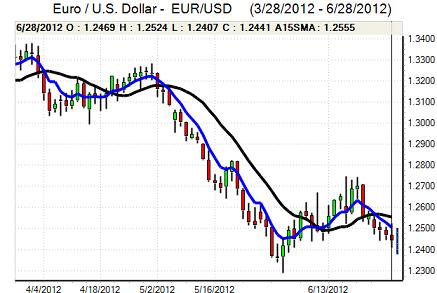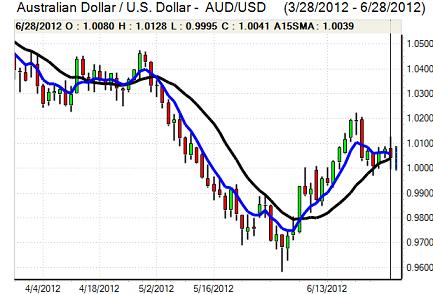EUR/USD
The Euro was subjected to sharp selling pressure in European trading on Thursday as German Chancellor Merkel continued to indicate that there would be a hard-line and no concessions on Eurobonds at the EU Summit starting on Thursday.
There was also a weaker than expected German employment report which had some negative impact on confidence while the latest business confidence index also weakened further. A break below the 1.2450 area triggered fresh stop-loss selling and pushed the currency to lows just above 1.24. There was further speculation that the ECB would cut interest rates at July’s meeting given the severe deterioration in growth.
Ahead of the New York open, the Euro rallied briefly on media reports that the German Finance Ministry was prepared to negotiate on Eurobonds and there was also speculation that EFSF funds could be used to buy peripheral bonds before slipping again after the Ministry denied this speculation.
The US economic data did not have a major impact with initial jobless claims falling to 386,000 in the latest week from a revised 392,000 the previous week.
Summit tensions remained extremely high with Spain and Italy effectively blocking agreement on a EUR120bn growth package unless there was a deal to bring down their borrowing costs. After intense negotiation, leaders agreed that ESM funds would be able to be used to help stabilise bond markets. There would be no increase in the sovereign debt levels and the ESM funds would not have seniority over sovereign bonds while there would also be no need for troika supervision. There would be new powers for the ECB to oversee the banking sector, due to be in place by the end of this year.
There was immediate relief that some form of deal had been agreed and the Euro spiked higher to a peak above the 1.26 level. The peripheral bond markets will be watched very closely on Friday and the German reaction will also be watched very closely with the ESM due to be agreed in parliament. There will also be frustration within other peripheral countries such as Spain.

Source: VantagePoint Intermarket Analysis Software
Call now and you will be provided with FREE recent forecasts
that are up to 86% accurate* 800-732-5407
If you would rather have the recent forecasts sent to you, please go here
Yen
The dollar was unable to gain any traction during the European session on Thursday and retreated to lows near 79.25 as risk appetite deteriorated in tandem with a decline in equity markets.
There were further underlying concerns surrounding the Japanese fundamentals, but these were of secondary importance at this stage with markets still focussed on the Euro-zone situation. The latest economic data was mixed with a sharper than expected decline of 3.1% for industrial production while the PMI index dipped to below the 50 level.
The labour-market and household spending data, however, was stronger than expected. The dollar was unable to hold above the 79.50 level against the yen while the Euro struggled to hold above the 100 level.
Sterling
Sterling was unable to hold the 1.56 level against the dollar on Thursday and retreated sharply during the European session. Although primarily a function of wider US gains, the domestic data provided no support.
The first-quarter GDP estimate remained at -0.3% according to the final estimate, but there were downward revisions to the previous data which undermined confidence in the underlying outlook.
The first-quarter current account deficit widened to GBP11.2bn from GBP8.7bn previously and the latest Bank of England consumer credit survey suggested both a tightening in conditions for the second quarter and a likely further tightening in the current three-month period. This will maintain concerns surrounding the outlook for consumer spending and consumer confidence remained trapped at the -29 level according to the latest data.
From a low just below 1.55 against the dollar, the UK currency pushed to a high above 1.56 as the Euro moved above 0.8050.
Swiss franc
The dollar maintained a firm tone in Europe on Thursday and pushed above the 0.9650 resistance area as European currencies were subjected to wider selling pressure. The franc rallied sharply to a high near 0.95 following the EU Summit deal while the Euro made a marginal net advance.
The National Bank will hope that the EU deal will help stem capital flows into the franc which would also ease pressure on the minimum level. Investor sentiment remains generally risk averse within Switzerland and this will continue to dampen any capital outflows from the Swiss currency.

Source: VantagePoint Intermarket Analysis Software
Call now and you will be provided with FREE recent forecasts
that are up to 86% accurate* 800-732-5407
If you would rather have the recent forecasts sent to you, please go here
Australian dollar
The Australian dollar was unable to hold above the 1.01 level in Europe on Thursday and retreated sharply to lows near 1.0050 and after a period of stabilisation, there was renewed selling in New York as Wall Street retreated.
There was further unease surrounding the Asian growth outlook. Speculation over further Chinese monetary policy easing and reserve diversification into the Australian currency helped stem selling pressure to some extent.
The EU Summit deal had an important impact on the Australian dollar and the currency rallied strongly to a peak in the 1.0170 area following the EU deal.



